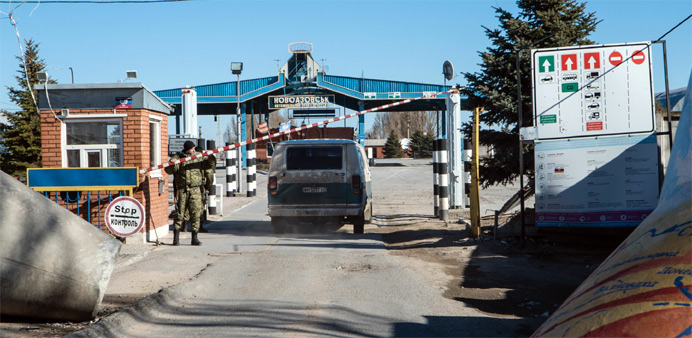AFP/ Kiev
A UN-backed ceasefire showed signs of taking hold in Ukraine on Wednesday, but tensions remained high after the US accused Russia of "lies" and Britain ordered a small troop deployment to train Kiev's forces.
Russia in turn has warned it could cut off gas supplies to Ukraine by the weekend -- and, by extension, to parts of the European Union.
For the first time since the European-brokered truce was imposed February 15, no deaths were reported in Ukraine's war zone by either side for the past 24 hours.
"Over the past day, one soldier was wounded but there were no dead," Ukrainian military spokesman Andriy Lysenko told journalists in Kiev.
There was still no confirmation, though, from the Organization for Security and Cooperation in Europe (OSCE) of a pull-back of heavy weapons from the frontline -- the other key plank of the truce.
Rebels insisted they were withdrawing artillery, rocket launchers and tanks from some areas, and journalists saw a column of howitzer guns being driven along a road near the separatist stronghold of Donestk.
"We are following orders to pull back heavy weapons, but the Ukrainians aren't," a rebel commander going by the nickname "Khoroshii" told AFP.
But the head of the OSCE mission in Ukraine, Ertugrul Apakan, said in a statement the warring sides had not provided the information needed to determine what, if any, arms withdrawals have occurred.
Kiev says it will not carry out an arms pull-back until a full and "comprehensive" ceasefire is observed and has accused Russia of continuing to send military hardware in to bolster the rebels.
- Exasperation with Russia -
The West has thrown its hopes of finding a negotiated solution to Ukraine's 10-month conflict fully behind the truce, which last week won unanimous backing from the UN Security Council.
But continued breaches by rebel forces -- especially their assault on Debaltseve, a strategic transport hub, and a build-up and attacks on Ukrainian army positions near the port city of Mariupol -- have exasperated the EU and US.
US Secretary of State John Kerry on Tuesday launched his most scathing accusation to date over Russia's alleged involvement in the conflict.
"They have been persisting in their misrepresentations -- lies -- whatever you want to call them -- about their activities there to my face, to the face of others, on many different occasions," he told US lawmakers.
He said Russia was also engaging in "a rather remarkable period of the most overt and extensive propaganda exercise that I've seen since the very height of the Cold War".
British Prime Minister David Cameron separately announced his country was sending up to 75 soldiers to Ukraine on a "training mission", with some leaving for Kiev this week. He said they would not be sent to the conflict zone.
Cameron urged the EU to look at wide-ranging sanctions on Russia's economy, which is already toppling into recession because of a drop in oil prices.
"We should look at other avenues as well -- obviously looking at the SWIFT banking issues is a big decision but there is a logic for it," he said.
SWIFT refers to the international financial industry's secure messaging system that facilitates transactions. Western sanctions in 2012 cutting Iran off from the system for defying UN resolutions over its nuclear programme dealt a severe blow to the Islamic republic's economy.
- 'Worst crisis since Cold War' -
Moscow's denials of backing the insurgency have been dismissed by the West.
The United States says it has evidence of Russian military deployments, and pointed to similar denials -- later dropped by Moscow -- over Russian troop involvement ahead of last year's annexation of Crimea.
Russia is flexing its muscles in readiness for any additional sanctions against it. Its state-owned gas giant Gazprom has threatened to cut off supplies to Ukraine this week, disputing Kiev's claim that the gas needed was paid for. Much of the gas that flows through Ukraine goes on to supply the EU market.
The Ukraine conflict is "the worst crisis of European security since the end of the Cold War," the chairman of the OSCE, Serbian Foreign Minister Ivica Dacic, said in a statement on Wednesday after briefing the UN Security Council.

